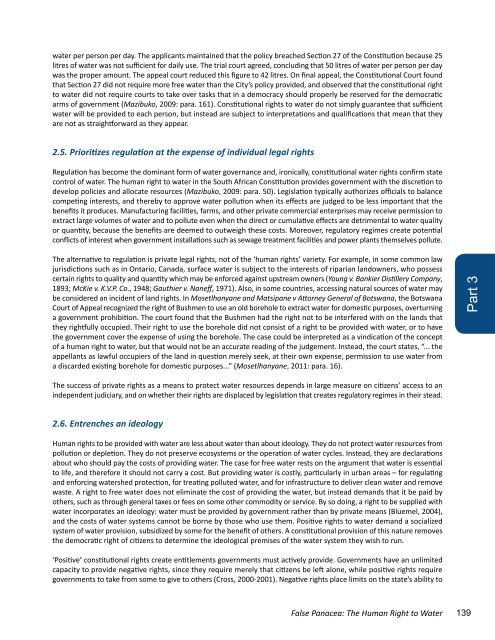The Global Water Crisis: Addressing an Urgent Security - Unu-inweh ...
The Global Water Crisis: Addressing an Urgent Security - Unu-inweh ...
The Global Water Crisis: Addressing an Urgent Security - Unu-inweh ...
You also want an ePaper? Increase the reach of your titles
YUMPU automatically turns print PDFs into web optimized ePapers that Google loves.
water per person per day. <strong>The</strong> applic<strong>an</strong>ts maintained that the policy breached Section 27 of the Constitution because 25<br />
litres of water was not sufficient for daily use. <strong>The</strong> trial court agreed, concluding that 50 litres of water per person per day<br />
was the proper amount. <strong>The</strong> appeal court reduced this figure to 42 litres. On final appeal, the Constitutional Court found<br />
that Section 27 did not require more free water th<strong>an</strong> the City’s policy provided, <strong>an</strong>d observed that the constitutional right<br />
to water did not require courts to take over tasks that in a democracy should properly be reserved for the democratic<br />
arms of government (Mazibuko, 2009: para. 161). Constitutional rights to water do not simply guar<strong>an</strong>tee that sufficient<br />
water will be provided to each person, but instead are subject to interpretations <strong>an</strong>d qualifications that me<strong>an</strong> that they<br />
are not as straightforward as they appear.<br />
2.5. Prioritizes regulation at the expense of individual legal rights<br />
Regulation has become the domin<strong>an</strong>t form of water govern<strong>an</strong>ce <strong>an</strong>d, ironically, constitutional water rights confirm state<br />
control of water. <strong>The</strong> hum<strong>an</strong> right to water in the South Afric<strong>an</strong> Constitution provides government with the discretion to<br />
develop policies <strong>an</strong>d allocate resources (Mazibuko, 2009: para. 50). Legislation typically authorizes officials to bal<strong>an</strong>ce<br />
competing interests, <strong>an</strong>d thereby to approve water pollution when its effects are judged to be less import<strong>an</strong>t that the<br />
benefits it produces. M<strong>an</strong>ufacturing facilities, farms, <strong>an</strong>d other private commercial enterprises may receive permission to<br />
extract large volumes of water <strong>an</strong>d to pollute even when the direct or cumulative effects are detrimental to water quality<br />
or qu<strong>an</strong>tity, because the benefits are deemed to outweigh these costs. Moreover, regulatory regimes create potential<br />
conflicts of interest when government installations such as sewage treatment facilities <strong>an</strong>d power pl<strong>an</strong>ts themselves pollute.<br />
<strong>The</strong> alternative to regulation is private legal rights, not of the ‘hum<strong>an</strong> rights’ variety. For example, in some common law<br />
jurisdictions such as in Ontario, C<strong>an</strong>ada, surface water is subject to the interests of ripari<strong>an</strong> l<strong>an</strong>downers, who possess<br />
certain rights to quality <strong>an</strong>d qu<strong>an</strong>tity which may be enforced against upstream owners (Young v. B<strong>an</strong>kier Distillery Comp<strong>an</strong>y,<br />
1893; McKie v. K.V.P. Co., 1948; Gauthier v. N<strong>an</strong>eff, 1971). Also, in some countries, accessing natural sources of water may<br />
be considered <strong>an</strong> incident of l<strong>an</strong>d rights. In Mosetlh<strong>an</strong>y<strong>an</strong>e <strong>an</strong>d Matsip<strong>an</strong>e v Attorney General of Botsw<strong>an</strong>a, the Botsw<strong>an</strong>a<br />
Court of Appeal recognized the right of Bushmen to use <strong>an</strong> old borehole to extract water for domestic purposes, overturning<br />
a government prohibition. <strong>The</strong> court found that the Bushmen had the right not to be interfered with on the l<strong>an</strong>ds that<br />
they rightfully occupied. <strong>The</strong>ir right to use the borehole did not consist of a right to be provided with water, or to have<br />
the government cover the expense of using the borehole. <strong>The</strong> case could be interpreted as a vindication of the concept<br />
of a hum<strong>an</strong> right to water, but that would not be <strong>an</strong> accurate reading of the judgement. Instead, the court states, “... the<br />
appell<strong>an</strong>ts as lawful occupiers of the l<strong>an</strong>d in question merely seek, at their own expense, permission to use water from<br />
a discarded existing borehole for domestic purposes...” (Mosetlh<strong>an</strong>y<strong>an</strong>e, 2011: para. 16).<br />
<strong>The</strong> success of private rights as a me<strong>an</strong>s to protect water resources depends in large measure on citizens’ access to <strong>an</strong><br />
independent judiciary, <strong>an</strong>d on whether their rights are displaced by legislation that creates regulatory regimes in their stead.<br />
2.6. Entrenches <strong>an</strong> ideology<br />
Hum<strong>an</strong> rights to be provided with water are less about water th<strong>an</strong> about ideology. <strong>The</strong>y do not protect water resources from<br />
pollution or depletion. <strong>The</strong>y do not preserve ecosystems or the operation of water cycles. Instead, they are declarations<br />
about who should pay the costs of providing water. <strong>The</strong> case for free water rests on the argument that water is essential<br />
to life, <strong>an</strong>d therefore it should not carry a cost. But providing water is costly, particularly in urb<strong>an</strong> areas – for regulating<br />
<strong>an</strong>d enforcing watershed protection, for treating polluted water, <strong>an</strong>d for infrastructure to deliver cle<strong>an</strong> water <strong>an</strong>d remove<br />
waste. A right to free water does not eliminate the cost of providing the water, but instead dem<strong>an</strong>ds that it be paid by<br />
others, such as through general taxes or fees on some other commodity or service. By so doing, a right to be supplied with<br />
water incorporates <strong>an</strong> ideology: water must be provided by government rather th<strong>an</strong> by private me<strong>an</strong>s (Bluemel, 2004),<br />
<strong>an</strong>d the costs of water systems c<strong>an</strong>not be borne by those who use them. Positive rights to water dem<strong>an</strong>d a socialized<br />
system of water provision, subsidized by some for the benefit of others. A constitutional provision of this nature removes<br />
the democratic right of citizens to determine the ideological premises of the water system they wish to run.<br />
‘Positive’ constitutional rights create entitlements governments must actively provide. Governments have <strong>an</strong> unlimited<br />
capacity to provide negative rights, since they require merely that citizens be left alone, while positive rights require<br />
governments to take from some to give to others (Cross, 2000-2001). Negative rights place limits on the state’s ability to<br />
False P<strong>an</strong>acea: <strong>The</strong> Hum<strong>an</strong> Right to <strong>Water</strong><br />
Part 3<br />
139




